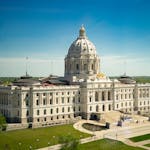 See
more of the story
See
more of the story
Think you've heard a lot already about this year's U.S. census, and it's only January?
If I may employ the vernacular: You ain't heard nothin' yet. Census Day doesn't dawn until April 1 — no foolin'.
Though I possess a journalist's impatience with seeing the same story day after day, I've resolved to stretch my tolerance for repetition when it concerns the constitutionally required count of every human that resides in this nation. The decennial census is worth some extra ink. It's fundamentally about three things Americans prize — power, money, and a voice about both. Submitting a census form in 2020 ought to rank right up there with voting as every adult American's civic duty.
That's been true of every census. But this year, it's more true in Minnesota than it has been in most states and most decades. This state has a congressional seat at stake in this census, plus its rightful share of the 55 federal spending programs whose outlays are driven by census tallies. We're talking real money here. In fiscal 2016 alone, the census-related federal flow into this state was a cool $15.5 billion.
As for that congressional seat: If Minnesota goes from eight districts to seven, those seven districts are projected to be the sixth most populous in the country. Each Minnesota member of the U.S. House would represent about 100,000 more people than the state's U.S. reps do today. In effect, it would dilute every Minnesotan's voice in the U.S. House by nearly 15%.
Fortunately, awareness that this census really matters sank in early among many of this state's leaders. They did what is Minnesotans' wont: They organized a bunch of committees. An oversight group called the Minnesota Complete Count Committee, launched by Gov. Mark Dayton, has been functioning since 2018. It has spawned about 265 offspring all over this state, offering microgrants for census-promotion activities. More committees are likely to form in coming weeks, state demographer Susan Brower says.
Perhaps as significant is another new-this-time entity, the Minnesota Census Mobilization Partnership, and its prime movers at the Minnesota Council on Foundations. The partnership aims to target historically undercounted groups in Minnesota — low-income people, remote rural people, recent arrivals from foreign lands, Native Americans, students, the isolated elderly. The idea is to enlist the help of people already known and trusted by such Minnesotans in a census completion campaign, often to be conducted one reluctant filer at a time.
There's a lot to like about this development. It's a show of stepped-up commitment to democratic engagement by this state's charitable foundations — a potent but previously somewhat reticent force for keeping democracy strong in this state.
The foundations that are taking the lead in census promotion are in many cases legatees of this state's industrial pioneers — people named McKnight, Blandin, Hill, Bush — who benefited greatly from the American system. It's fitting that they should embrace a foundational (pardon the pun) step in assuring that America's representative democracy remains indeed representative and democratic.
I asked Kathleen Annette why the Blandin Foundation, where she has served as president and CEO for nine years, decided to make the census a priority in the year before her planned retirement in June. Blandin has contributed more than $125,000 to the work to date. Annette is co-chair of the state Complete Count Committee; she and four other Blandin staffers are spending hours each week making calls and going to meetings to plot census strategy. The Blandin website is a rich resource of census information tailored for rural community leaders.
"Everywhere I go, I hear about the needs," Annette said about her years at Blandin's helm. The foundation is based in Grand Rapids, near the northern counties that had the state's lowest census response rate in 2010. Its philanthropic focus is greater Minnesota, where a rebound from the Great Recession has been slow in coming.
"I hear everywhere about the need for help with the basics — education, health care, infrastructure. The census is one of the ways we can get the resources we need."
That's the money part of her census pitch. But power and voice are part of her message, too.
"Our voice matters," Annette said. "That's true for every Minnesotan, I suppose. But right now it's really important that our voices in rural Minnesota matter."
She's right: A sense of eroding power and diminishing voice has settled into rural psyches in recent years, causing ill effects that reach beyond rural places. When it's seen as fair and complete, the census can be a tool of grassroots empowerment. That would be a welcome spirit in many of the communities Blandin knows best.
The foundations' involvement also comes at a time when government ought not be the only face of the census. Government's face is not everywhere seen as a friendly one.
"We are seeing a much more significant level of concern this time among people who are fearful of government in general or fearful about sharing any information with government," said Marcia Avner, a St. Paul-based consultant who 10 years ago participated in census efforts as an executive at the Minnesota Council of Nonprofits. "Refugees, asylumees, immigrants, or just people who think government knows too much about them already — they are all reluctant to participate."
That sentiment spiked in 2018 when the Trump administration moved to add a citizenship question to the census form — a reaction that, documents later showed, was the administration's intent. Add that question, and undocumented immigrants would be understandably loath to tell the government who they are and where they live.
The 2018-19 flap over the citizenship question, which was ultimately disallowed from the form by the U.S. Supreme Court, might have sent some Minnesota census-backers running for cover. Foundations have a well-known aversion to partisan controversy.
Instead, Avner said, "we've been seeing fearful populations' leaders push back. We see signs of courage." For example, she said, 34 Minnesota mosques have formed Complete Count Committees. "They understand, 'If we don't count, we don't get resources, we don't get political power.' "
Courage was also shown by the state's foundations. Instead of hunkering down until the citizenship question issue was resolved, they spoke out. A portion of Annette's protest to the U.S. Department of Commerce is posted on Blandin's website: "I know personally … that the very persons who are traditionally undercounted will be further driven from participation in the 2020 Census out of fear and mistrust, should the proposed citizenship question continue."
The offending question is out. In its wake is likely some residual reluctance to fill out a census form. But in its wake is also a closer bond connecting foundations and advocates for undercounted people. There's deeper resolve to reach out to Minnesotans on society's margins. There are innovative strategies for assuring those people that they matter, and that participating in the census is an assertion of control over a government that rightfully belongs to every American.
In this election year, those developments might be only the start of the good that could come from a complete count.
Lori Sturdevant is a retired Star Tribune editorial writer. She is at lsturdevant@startribune.com.





